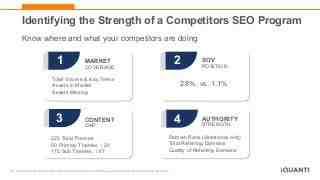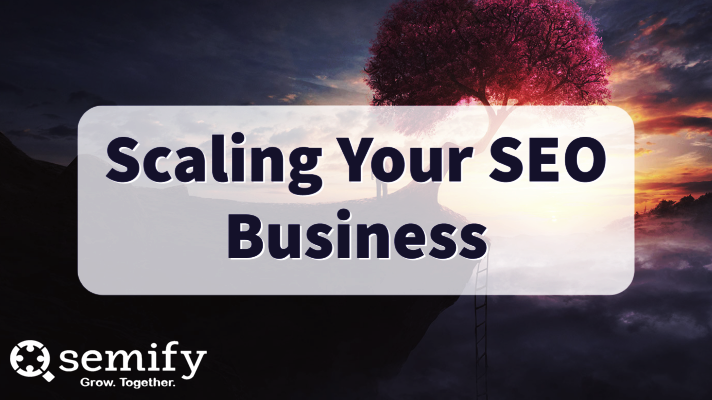Want to scale your SEO processes?
Are you equipped to factor the ever-changing digital landscape into your plans for growth?
Any marketer would agree that scaling in today’s digital age can be a complex challenge.
However, by taking a complex, fine-tuning and strategic approach, you can seamlessly scale an SEO program at an enterprise level.
On July 13th, I moderated a webinar with Wayne Cichanski, VP of Search & Site Experience at iQuanti, and Anwesha Mazumdar, head of Credello.
Cichanski and Mazumdar presented a scalable SEO program that works.
Here is a summary of the webinar. To access the entire presentation, complete the form.
1. Capture Consumer Demand
Understand what consumers and your audience are looking for.
If you don’t have content that matches the user journey, they can’t get to your site on the demand they’re looking for.
You want to create that content to keep that traffic on board.
How do you create the content your audience is looking for? Start by compiling keywords.
2. Compile Keyword Data

Take that journey data, the persona, that funnel connection, and apply that to your keyword research.
Keywords should be moved around content.
[3 ways to approach keyword research & how Credello did it] Access the webinar now →
Group Keyword Data By Like-Minded Intent
Map & group keywords by similar intent. Then isolate and develop content to match that intent.
One intent equals one content page.
[Discover Credello’s approach to capturing demand] Access the webinar now →
3. Assess Your Competition

Know the key metrics to identify the health of your competitors.
The keyword landscape you just identified will define your markets, products or service throughout that entire funnel journey.
That market landscape becomes your baseline, your north star.
Compare Market Strength Share
Compare those intents with your web pages, and figure out what you have in the market, what’s published and what’s missing, like a health check.
[See example] Access the webinar now →
Identify The Strength Of A Competitor’s SEO Program
Know where and what your competitors are doing in terms of terms.
[Find out what each factor means] Access the webinar now →
4. Scale Your Content Program

To close significant content gaps, you’ll need to know what you’re trying to achieve with your content.
It can be achieved by considering the following factors:
[Dive deeper into each element and see how Credello did it] Access the webinar now →
5. Prioritize Your Efforts

Knowing what to do and when is critical.
Start by grouping tactics by effort and teams for concurrent workflows.
How To Group Tactics
6. Piggyback On Sprint Cycles
Sprint cycles allow you to make adjustments and progress.
Since the sprint cycles are already planned, dedicated and targeted to a particular page, template or initiative, you only add SEO value to that.
Put your puzzle pieces into those sprint cycles on a template and page level.
[See how Credello ran the program] Access the webinar now →
[Slides] How to Scale Your Enterprise SEO Program
Join Us For Our Next Webinar!
Getting Started In SEO: 10 Things Every SEO Strategy Needs To Succeed
Looking to start an SEO strategy for your business? Learn the ten things every SEO campaign needs to succeed.
Featured image: Paulo Bobita/Search Engine Journal
Why SEO is required?
In short, SEO is crucial because it makes your website more visible, and that means more traffic and more opportunities to convert prospects into customers. Check out the SEO tools you can use for optimal ranking.
What is SEO, why is it required? SEO stands for Search Engine Optimization. In the simplest terms, good SEO optimizes your visibility online. This means that the more people see your website, the more your internet traffic increases, and the better your chances of providing your product or service to a greater number of people.
Why is SEO required for my website?
Why is SEO necessary for my website? Having a website is not enough to get business. You need to rank higher in Search Engine Results Pages (SERPs) to get traffic and the required visibility. We as a leading SEO company in India will help you optimize your website to get higher ranking on search engines.
What happens if you don’t use SEO?
If you stop doing SEO, you will eventually start seeing lower rankings in search results. Over time, this will lead to less organic traffic to your website and less visibility online. Your rankings will continue to drop until you use SEO strategies to increase them again.
Does SEO really matter?
Whether you invested early in SEO or are just starting out, it can still be an important driver of traffic and leads to your website. SEO is especially useful for locally focused businesses, those looking to reach more users with their content and businesses hoping to adopt a multi-channel approach.
Why SEO is so important to businesses?
It Helps You Rank Better In Local Searches And nearly 80% of local searches on mobile lead to conversions. Local SEO strategies can help you attract these searchers who are often ready to buy. The first step to getting started with local SEO strategies is to create a Google My Business account.
Why is SEO still important?
SEO matters, and the strategy is more important than ever. It’s a vital component to successful digital marketing efforts, and it can be the difference between attracting tons of website traffic and getting lost among the billions of other websites on the Internet.
Why is SEO still relevant?
SEO is a much more effective long-term strategy than PPC because SEO rankings are more stable. SEO is considered to have more long-term benefit than PPC or any other form of paid advertising. Another advantage of SEO is that it is considerably more cost-effective than PPC when you look at its long-term effectiveness.
Why is SEO important in 2021?
SEO research allows you to understand user interest and intent and build content that addresses and captures that intent. Content Distribution. A focus on SEO and legitimate link building leads you to develop relevant, useful content that people want to share and provides digital word of mouth.
Why SEO is important on a business?
The higher you rank in results pages, the more clicks and traffic your website will generate. SEO also improves user experience, making it more likely that customers will become repeat buyers. And SEO is cost effective. Competitive industries can spend large amounts of money on paid website traffic.
What is SEO and why is SEO important for every business?
SEO consists of multiple strategies, actions, and best practices, all of which have the ultimate goal of improving your website’s position in search engines—that’s why it’s called “search engine optimization.†There are two types of SEO. : on-page and off-page.
What is SEO & Why is it important?
SEO stands for search engine optimization – the practice of increasing the quantity and quality of traffic to your website through organic search engine results. The ultimate goal of SEO for a business is to generate organic traffic – searchers clicking through to your website from a search engine results page (SERP).
What SEO means?
Search engine optimization is the science of improving a website to increase its visibility when people search for products or services. The more visibility a website has on search engines, the more likely a brand is to capture business.
What is SEO and how does it work? Well, SEO stands for ‘Search Engine Optimization’ which is the process of getting traffic from free, organic, editorial or natural search results in search engines. It aims to improve the position of your website in search results pages. Remember, the higher the site is listed, the more people will see it.
What is an example of SEO?
How they determine the “best” result is based on an algorithm that takes into account authority, relevance to that question, loading speed and more. (For example, Google has over 200 ranking factors in its algorithm.) Most of the time, when people think “search engine optimization†, they think “Google SEO†.
What is SEO in digital marketing explain with examples?
Search engine optimization or SEO is the way that companies can increase their traffic through search engines with the goal of pushing their websites and names at the top of any search results page. This can be through search results made organically or editorially.
What is SEO in simple words?
SEO stands for search engine optimization — that’s pretty much stayed the same. It refers to techniques that help your website rank higher in search engine results pages (SERPs).
What is SEO of a website?
SEO – Search Engine Optimization: the process of improving your website for search engines. Also the job title of a person who does this for a living: We just hired a new SEO to improve our web presence.
What are the 4 types of SEO?
Having explained the approaches to search engine optimization, we can now go over what the different types of SEO are.
- On-page SEO (on-site SEO) …
- Off-page SEO (off-site SEO) …
- Technical SEO. …
- Local SEO.
What is SEO in simple words?
SEO stands for search engine optimization — that’s pretty much stayed the same. It refers to techniques that help your website rank higher in search engine results pages (SERPs).
What is meant by Google SEO?
SEO – Search Engine Optimization: the process of improving your website for search engines. Also the job title of a person who does this for a living: We just hired a new SEO to improve our web presence.
What is SEO in easy language?
SEO stands for “search engine optimization”. In simple terms, it means the process of improving your website to increase its visibility when people search for products or services related to your business on Google, Bing and other search engines.
What are the 4 types of SEO?
Having explained the approaches to search engine optimization, we can now go over what the different types of SEO are.
- On-page SEO (on-site SEO) …
- Off-page SEO (off-site SEO) …
- Technical SEO. …
- Local SEO.
What 4 pillars are important in SEO?
The four pillars of SEO include technical SEO, content, on-site optimization and off-site SEO.
How is enterprise SEO different?
What makes enterprise SEO different? The main difference between small business/mid market SEO and enterprise SEO strategies is that the tactics for larger organizations must be scalable for thousands of web pages.
What are the 4 types of SEO? Having explained the approaches to search engine optimization, we can now go over what the different types of SEO are.
- On-page SEO (on-site SEO) …
- Off-page SEO (off-site SEO) …
- Technical SEO. …
- Local SEO.
What is an enterprise SEO?
Enterprise SEO is the strategy to improve organic search presence for enterprise websites consisting of hundreds of thousands or even millions of pages. While the fundamentals of SEO do not change significantly at the enterprise level, what does change is the scale.
What is difference between SEO and digital marketing?
SEO is a Digital Marketing Tool. Search engine optimization focuses primarily on the ranking of a website. Digital marketing aims to boost and promote the brand through different digital channels like websites, social media, emails etc.
Is SEO the same as digital marketing? The Meaning of SEO (Search Engine Optimization) SEO is a part of digital marketing, and it is actually a set of tools and best practices that help websites achieve higher search engine rankings.
Is SEO necessary for digital marketing?
by Digital Marketing Institute SEO consists of several elements, and knowing what they are and how they work is key to understanding why SEO is so important. In short, SEO is crucial because it makes your website more visible, and that means more traffic and more opportunities to convert prospects into customers.
Is SEO still relevant in 2022?
Will SEO still be relevant in 2022? Yes of course. Although some SEO tactics that were effective in the past have stopped working, SEO has continued to evolve. Constantly reinventing itself to try to better match user intent, cutting out the spammy, ineffective tactics to improve.
Do you really need SEO?
If SEO isn’t right for someone – or at least, not right now – then they deserve to know that. But if you want to spread your message further or grow your income, then SEO may be just what you need.
What is better SEO or digital marketing?
SEO optimization is the most effective way to grow and expand a small business. 57% of B2B marketers believe that lead generation through SEO is the highest compared to any other digital marketing strategy. Most customers these days find local businesses through the internet.
What is SEO and why it is so important in digital marketing?
SEO stands for search engine optimization – the practice of increasing the quantity and quality of traffic to your website through organic search engine results. The ultimate goal of SEO for a business is to generate organic traffic – searchers clicking through to your website from a search engine results page (SERP).
What is the role of SEO in digital marketing?
SEO stands for Search Engine Optimization and is the process used to optimize a website’s technical configuration, content relevance and link popularity, so that its pages can become easy to find, more relevant and popular to users’ search queries, and as a result, search engines rank them better .
What is better SEO or SEM?
With SEO, it can take months or even years before your business starts ranking on the first page of search engines. And this is why SEM is better for testing than SEO… Because you can turn SEM paid ads off and on instantly, it’s a great strategy for testing.

